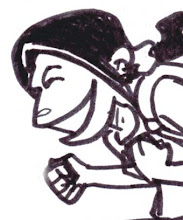If you're willing to practice the techniques you learn from drum lessons regularly, then drum lessons are definitely for you. However, if you're not willing to make a daily time commitment to practicing playing the drums, you still can benefit from taking lessons, but you'll definitely learn at a much slower pace then a drummer who practices would.
The main reason that regular practice is so important for drummers is that when you practice something like a drum roll, the movements done by your fingers and wrists slowly get imbedded in your muscle memory, making it easier for you to play a drum roll the next time you see. This concept also applies to your feet and the bass drum.
Want to start grooving? You have to practice!
In addition, the most important thing for a drummer to do is to really feel and understand the rhythm of whatever drum beat they're playing so they can start grooving to it. When a drummer's playing near perfect rhythm, they're making the drum set piece they're playing come alive, allowing the listener to feel the drum beat. Sounds cool, right? You may be thinking, 'just how can a drummer accomplish this?' The answer, of course, is to practice regularly. Not only do you have to practice regularly, you also have to practice the right way to understand the concept of rhythm and groove, which is where lessons by a good drum teacher will come in handy.
Finding a drum teacher
Go to your local drum store, and ask them if they offer drum lessons. If they don't, look around the store for any bulletin boards where drummers post band information and you may be able to find an offer for weekly drum lessons. Still can't find a drum lesson? Try your local community centers, or try going to any places with musical equipment and asking around there. By then, you should be able to find somebody offering a drum lesson You can also try checking out the links on the bottom of this page for a few different directories of drum lessons being offered all over the US.
The drum teachers that I've talked to are all very passionate about drum sets, and many of them play professionally in bands, so you should be able to get a good lesson from just about any drum teacher. Most drum teachers offer lessons once a week, for 30 minutes to an hour. (I'm sure though, if you wanted to take more lessons a week you could.) Monthly lessons should be affordable (I pay 60 dollars a month for weekly drum lessons), but if you're really on a tight budget you might be able to negotiate with the teacher for a lower price.
Anyone can benefit from a good drum lesson
What you work on during a drum lesson will be different depending on your skill level. Beginners may work on snare drum rudiments and drum fundamentals, while more intermediate and advanced drummers work on how to play drum solos. (You can really work on anything you want though, just ask your drum teacher what you want to learn and I'm sure they'd be glad to help you.) No matter what your skill level, a good drum teacher should be able to listen to whatever you're playing on a drum set, and immediately tell you what you're doing incorrectly and correctly.
How drum lessons have helped me
I've been taking drum lessons for years now, and I've some excellent tips on how to practice better technique, play quicker, and become a better drummer overall. The best benefit of drum lessons definitely are to learn the concept of drumming from a veteran in the drumming world, which a drum teacher almost always is.







